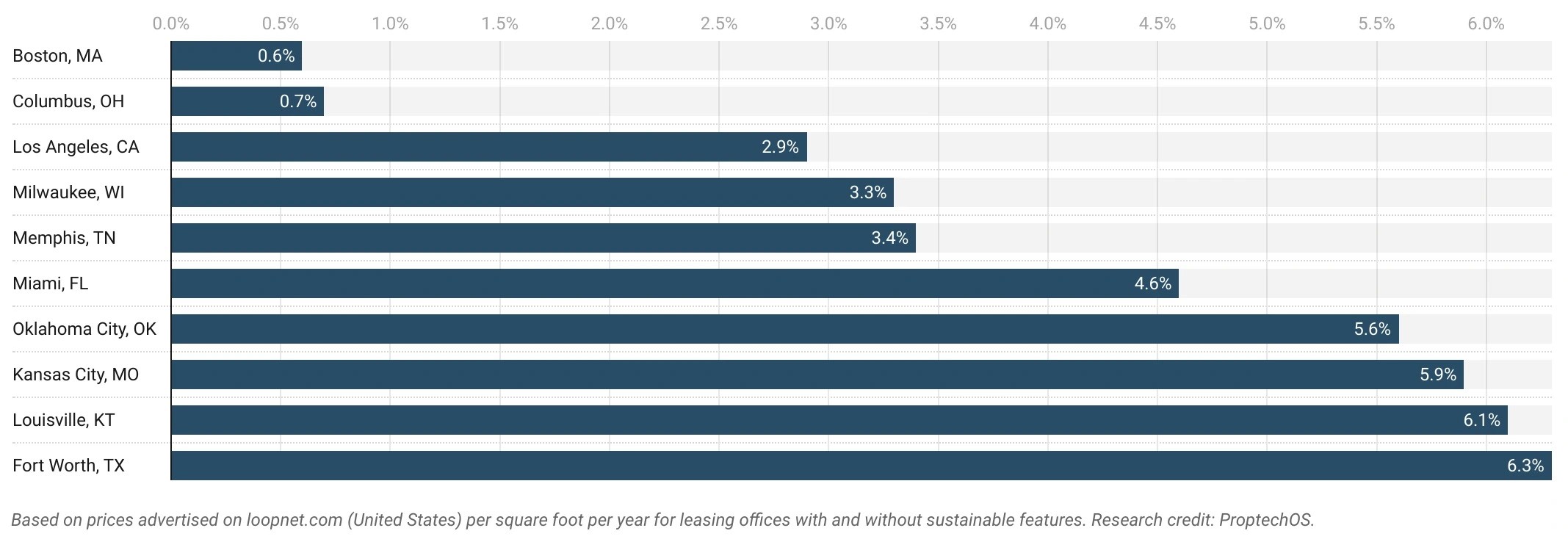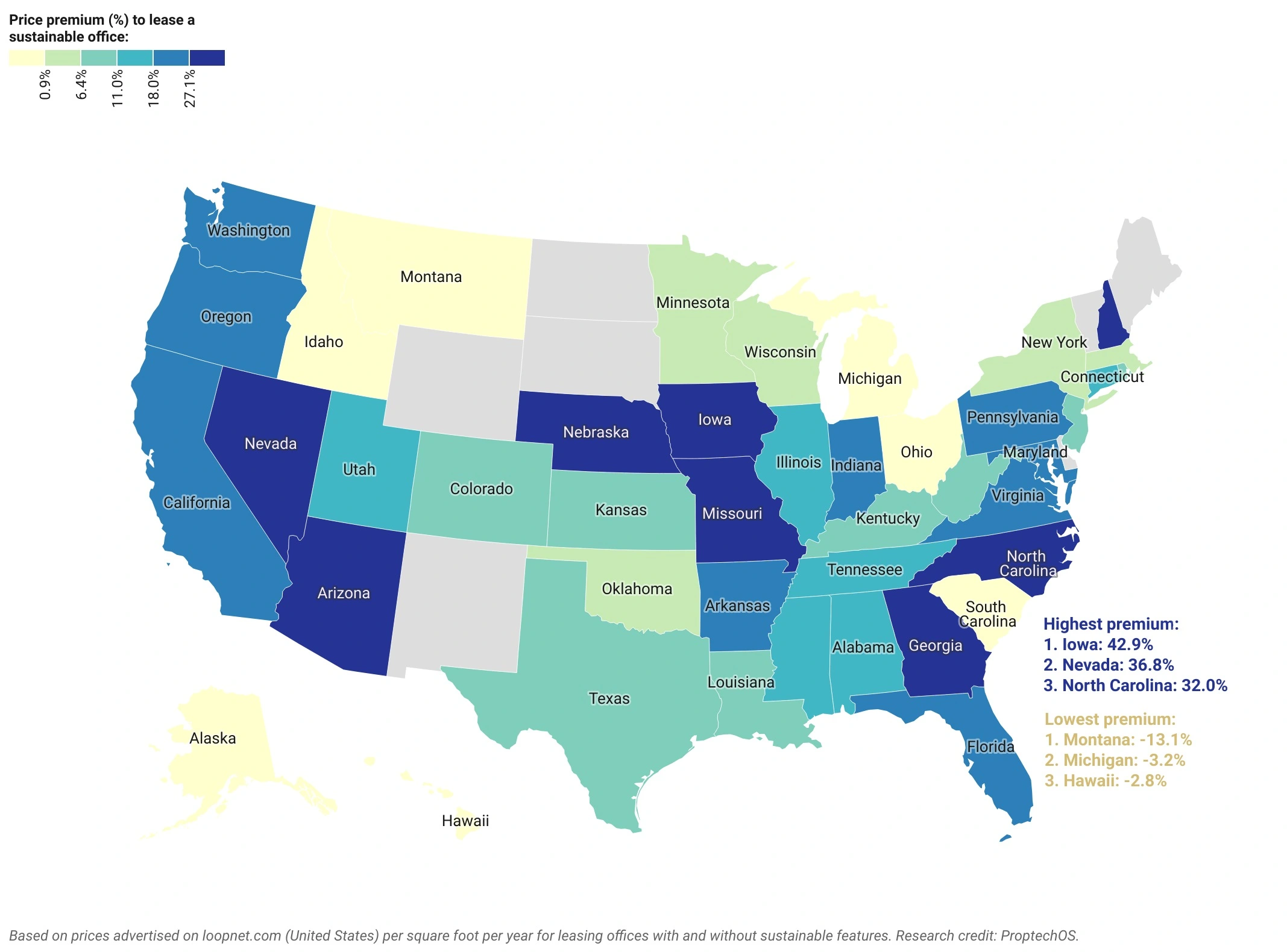The price premium for sustainable offices
With insights derived from over 40,000 commercial property listings, this study provides an in-depth look at the price premium to lease sustainable offices in each US state and in major US cities.
The United States is one of the leading countries in building sustainable commercial spaces.
As well as boasting the flagship sustainable offices of major companies, such as Apple’s California HQ or Alphabet’s Googleplex, the United States also has the largest amount of LEED-certified buildings in the world—many of which are commercial.
For US-based business owners, there are many positives to working from a sustainable office for themselves and their employees.
Sustainable features such as natural light, biophilic design and improved air quality are linked to much greater health and wellbeing outcomes, both at work and in general living spaces.
How we researched the price premium for sustainable offices
For this article, we have analyzed more than 40,000 commercial property listings on Loopnet.com to calculate how much more business owners pay (per square foot per year) to lease office spaces with sustainable features in each US state and in major US cities.
Our seed list of sustainable office features focused on spaces that list at least one of the following: natural light, solar power, bicycle storage, electric vehicle charging stations, Energy Star labels, and LEED certification (silver, gold, or platinum).
Employees are driving demand for eco-friendly offices
The demand from employees for sustainable places to work is clear. According to a 2022 survey by Essity, 75% of American office workers want their employer to provide a more environmentally friendly office.
The same survey also revealed this demand has increased since the pandemic and that more than half of workers in the survey currently felt their office was “shamefully eco-unfriendly”.
While the US provides plenty of options for selecting a sustainable workspace for different needs, this comes at a higher price to businesses than if they want to work in a less eco-friendly environment.
Market values LEED offices at 37% premium, reflecting strong demand
When we compare all of the office spaces in the United States, the most expensive sustainable asset for an office space is an LEED certification, which sees lease prices per square foot increase by an average of 37% compared to a standard office space.
The average price premium (%) for sustainable office features in the United States’ leasehold market

After LEED certification the next most-expensive sustainable feature is electric vehicle charging stations, which increases the price of leasing an office by an average of 27%.
Relative to the price of a non-sustainable office, the least expensive sustainable feature for an office space is solar panels. However, panels still add an average of 3% to the price of leasing an office in the United States.
Three California cities carry the biggest price premium for sustainable offices
Sacramento, San Jose, and Bakersfield are the three most expensive cities to lease sustainable office space in the US when comparing their price premium to the local average price of non-sustainable office buildings.
Although all three are located in California, their geography and affordability vary considerably.
Sacramento, the city with the largest price premium (+39.3%) for sustainable offices, is more affordable in general than San Jose but still somewhat expensive compared to the national average, particularly in terms of housing.
The US cities with the highest price premium (%) to lease a sustainable office

The city has experienced an influx of residents from the Bay Area, which has driven up home prices, though they remain lower than in the Bay Area.
On average, Sacramento business owners would pay an additional $8.30 per square foot per year for a sustainable office space vs a standard office with no sustainable features.
A large office space is typically sized at around 350 sq ft. per person, which means this price premium in Sacramento could equate to $2,905 paid per employee each year to lease a sustainable workspace.
Boston’s sustainable offices carry the lowest premium to lease
Business owners in Boston, Massachusetts pay the smallest premium to lease sustainable office spaces — on average they are priced as just 0.6% more than a non-sustainable office space.
However, Boston is one of the most expensive cities in the world, according to its cost of living. This factors in its real estate market, where more than half of property listings are priced at over $1 million USD. Therefore, a sustainable office is unlikely to be cheap here, even if it costs relatively little more to lease compared to a standard office.
The US cities with the lowest price premium (%) to lease a sustainable office

Columbus, Ohio’s sustainable offices are advertised at the second-lowest price premium among major US cities—worth just +0.7% more. In recent years Columbus has been named as one of the world’s leading cities for sustainability by the CDP.
Another major city where premiums are some of the lowest in the United States is Los Angeles (+2.9%).
Los Angeles is also not short of options for eco-friendly workspaces. The city has more sustainable office spaces available to lease (1,388) than any other US city in our analysis.
The exact dynamics behind the near-zero premium is beyond our study, but the cities with the lowest premiums tend to either have low general lease price levels, or tend to be cities with a high share of sustainable offices.
The states with the highest and lowest premiums for sustainable offices
Leasing sustainable offices in Iowa means paying the biggest difference (+42.9%) relative to the average price of non-sustainable offices in that state.
Offices to lease with sustainable features are in shorter supply in the Hawkeye State. Only 15% of offices in the Iowa market contain at least one feature that qualifies as sustainable.
The US states with the highest and lowest premium (%) to lease sustainable spaces

Montana is the US state with the lowest premium to lease sustainable offices. Based on the market analysis conducted, we can see that sustainable office spaces are priced at 13% lower than the average non-sustainable offices.
Many green building initiatives can be found throughout Montana, including the State Buildings Energy Conservation Program (SBECP), which aims to reduce energy costs for state government buildings. The program is self-funded and uses the savings from reduced utility bills to fund other projects.
Methodology
- Using loopnet.com, we collected publicly available data on office space listings for lease, covering over 40,000 office spaces across various US states and the 50 most populated cities. This information includes details on pricing for individual spaces within multi-tenant buildings.
- Using search filters for common sustainable features (natural light, solar power, bicycle storage, electric vehicle charging stations, Energy Star labels, and LEED certification: silver, gold, or platinum), we took the price to lease per square foot per year for each listing which contained at least one sustainable feature.
- We repeated this process for offices to lease that didn’t contain any sustainable features in their descriptions.
- For each US state and US city, we then calculated the average price of sustainable vs non-sustainable office listings per location and calculated their percentage price difference.
- When considering the national average price of a standard office space to lease, we obtained the figure of $32.89 per sq ft. from Commercial Edge’s September 2024 Office Space Report.
- Due to a shortage of data, seven US states had to be removed from the final analysis.
- Data correct as of October 2024.
For questions or queries, contact:
Anna Lundvall-Hedin
Marketing Manager
[email protected]